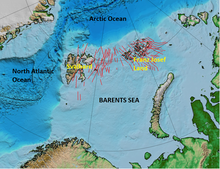Barents Sea dike swarm is a dike swarm in the northern Barents Sea. It consists of two groups of dolerite dikes across the Svalbard and Franz Josef Land regions. The emplacement of dikes was associated with the Cretaceous High Arctic Large Igneous Province (HALIP).[1][2]

Description
editAs revealed by aeromagnetic data, the dolerite dikes in the northern Barents Sea can be grouped in two regional dike swarms running oblique to the northern passive margin of the Barents Sea: the Franz Josef Land and Svalbard dike swarms, respectively. Multichannel seismic data indicate that the dikes fed the dolerite sills, resided in Permian to Early Cretaceous sedimentary strata in the East Barents Sea sedimentary basin. U/Pb dating of dolerites indicate an emplacement age of 121-125 Ma.[3]
References
edit- ^ Buchan, Kenneth L.; Ernst, Richard E. (2006). "The High Arctic Large Igneous Province (HALIP): Evidence for an Associated Giant Radiating Dyke Swarm". www.largeigneousprovinces.org. Retrieved 2018-10-10.
- ^ Embry, Ashton F.; Osadetz, Kirk G. (1988). "Stratigraphy and tectonic significance of Cretaceous volcanism in the Queen Elizabeth Islands, Canadian Arctic Archipelago". Canadian Journal of Earth Sciences. 25 (8): 1209–1219. Bibcode:1988CaJES..25.1209E. doi:10.1139/e88-118. ISSN 0008-4077.
- ^ Corfu, Fernando; Polteau, Stéphane; Planke, Sverre; Faleide, Jan Inge; Svensen, Henrik; Zayoncheck, Andrew; Stolbov, Nikolay (2013). "U–Pb geochronology of Cretaceous magmatism on Svalbard and Franz Josef Land, Barents Sea Large Igneous Province". Geological Magazine. 150 (6): 1127–1135. Bibcode:2013GeoM..150.1127C. doi:10.1017/S0016756813000162. ISSN 0016-7568.